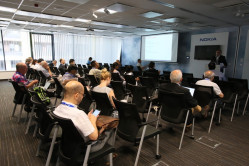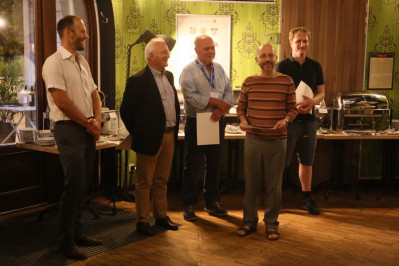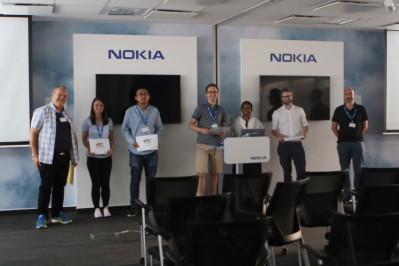ITC 31: Networked Systems and Services
27-29 August 2019, Budapest, Hungary
General chair:
Miklós Telek - Budapest University of Technology and Economics, Hungary
TPC chairs:
Ravi R. Mazumdar - University of Waterloo, Canada
György Dán - KTH Royal Institute of Technology, Sweden
Homepage: https://itc31.itc-conference.org/
ITC 31 Program in a Nutshell

Keynotes:
- Ness B. Shroff - Delay Optimality in Load Balancing Systems
- Anurag Kumar - Cyber Physical Systems over Wireless Networks: Performance, Designe, Inference, Control
- Mérouane Debbah - Mobile AI: From Cloud AI to on-device AI
Tutorials:
- Urtzi Ayesta (IRIT, Toulouse) on Load balancing, redundancy and multi-type job and server systems
- Nicolas Gast (Inria, Grenoble) on Mean field and refined mean field approximation
- Stefan Schmid (University of Vienna, Austria) on Reconfigurable Networks: Enablers, Algorithms, Complexity
Invited talk:
- Machine Learning in Telecommunication - industrial perspective :
Lóránt Farkas - AI research directions and results
Sessions
- Performance Analysis
- Mobile Communication
- Machine Learning in Telecommunication
- Wireless Networks
- Machine Learning Techniques for Networking
- Latency Scheduling
- Modeling
Arne Jensen Lifetime Award
The International Advisory Council (IAC) of the International Teletraffic Congress (ITC) is pleased to announce that the recipient of the 2019 Arne Jensen Lifetime Award is Prof. Dr. Ulf Körner.
ITC Rising Scholar Award 2019
The goal of the ITC Rising Scholar Award is to recognize young researchers with significant contributions to the ITC Community in the field of performance, traffic modeling and control in communication networks and networking science. It is our pleasure to award the 2019 ITC Rising Scholar Award to Prof. Dr. Thomas Zinner, associate professor at NTNU Trondheim, Norway. Thomas Zinner contributes to the teletraffic community (1) in a scientific way by formulating and solving problems in next generation networks like SDN or NFV by means of measurements, simulations, and analysis and (2) by strong community efforts through his dedication to the ITC conference.
ITC 31 Best Paper Award
Best Paper Award
A Processor-Sharing model for the Performance of Virtualized Network Functions by Fabrice Guillemin, Veronica Quintuna Rodriguez and Alain Simonian

The ITC 31 Award Recipients during the conference dinner (from right to left): Thomas Zinner (Rising Scholar Award), Alain Simonian (Best Paper Award), Ulf Körner (Arne Jensen Lifetime Award). The best paper award was given by Marco Ajmone Marsan and György Dan.
ITC 31 Facts
- Paper submissions: 46 registered, 34 submitted
- 15 full papers, 7 short papers accepted
- Acceptance rate: 15/34 ~ 44%
- Number of participants: 48. Additionally, 25 Nokia employee attended the talks.
ITC 31 Student Travel Grants
This year five Student Travel Grants were issued. This years recipients are
- Stefan Geissler, University of Würzburg, Germany
- Haritha Kallamadi, Indian Institute of Science, India
- Bart Post, Eindhoven University of Technology, The Netherlands
- Susanna Schwarzmann, TU Berlin, Germany
- Peiyue Zhao, KTH Royal Institute of Technology, Sweden

Welcome Message from ITC 31 General Chair
On behalf of the Organizing Committee, we are delighted to welcome you to the 31st International Teletraffic Congress, to be held between 27-29 August 2019 in Budapest, Hungary.
Since its foundation in 1955, ITC has established a multi-decade tradition as a primary forum for the latest research in a wide range of telecommunication related fields. Through the decades several generation of telecommunication technologies were invented, introduced, and replaced by newer and more efficient ones, while never imagined telecommunication services have become everyday practice.
Current research trends include softwarized/virtualized network paradigms, innovative wireless scenarios such as 5G and IoT systems, data mining/machine learning based network management, age of information based teletraffic theory, and so on. ITC 31 intends to be a vivid forum for latest results on these actively investigated research fields, where researchers from academy and industry find answers for current research problems.
Thanks to the generous offer of Nokia Bell Labs, the location of the conference is at Nokia Skypark which is the new Nokia Bell Labs site in Budapest. This location fittingly demonstrates the strong presence of telecommunication related industrial research in Budapest. Apart from Nokia, Ericsson has a significant research site in Budapest. Additionally, several governmental (universities and research institutes of the Hungarian Academy of Science) and non-governmental institutions are involved in telecommunication related research.
ITC 31 follows the tradition of the ITC conference series in delivering the Arne Jensen Lifetime Achievement award and the Rising Scholar award based on the decision of the International Advisory Council (IAC) chaired by Michela Meo (Politecnico di Torino, Italy). The ITC Rising Scholar Award recognizes young researchers with significant contributions to the ITC Community. The Arne Jensen Lifetime Achievement Award is given to an individual who has provided an exceptional contribution to traffic modelling, control and performance, and dedication to the teletraffic community.
The Best Paper Award will be granted to the best contribution presented at ITC 31. The best paper award will be selected by a committee appointed by our award chair (Marco Ajmone Marsan, Politecnico di Torino, Italy) based on the scientific merit of the publication as well as the quality of the oral presentation at ITC 31.
This time the conference program is integrated with three tutorial talks by
- Urtzi Ayesta (IRIT, Toulouse) on Load balancing, redundancy and multi-type job and server systems,
- Nicolas Gast (Inria, Grenoble) on Mean field and refined mean field approximation,
- Stefan Schmid (University of Vienna, Austria) on Reconfigurable Networks: Enablers, Algorithms, Complexity.
Several people contributed with dedication and hard work to make the organization of ITC 31 possible. Apart from getting plenty of useful advice and continuous supervision from the organizers of ITC 30, and the IAC, I would like to express my special thanks to the TPC co-chairs, Ravi R. Mazumdar (University of Waterloo, Canada) and György Dán (KTH Royal Institute of Technology, Sweden) the publicity chair, Corinna Schmitt (Universität der Bundeswehr München, Germany) the publication chairs, Lea Skorin-Kapov (University of Zagreb, Croatia) and Matthias Hirth (TU Ilmenau, Germany) the tutorial chair Florin Ciucu (University of Warwick, UK) and, last but not least, the whole local organizing group from the Budapest University of Technology and Economics and the MTA-BME Information Systems Research Group.
Finally, we hope that the inspiring environment that Budapest can offer its guests adds to the scientific adventure of the conference participants.
Miklós Telek (Budapest University of Technology and Economics, Hungary)
Budapest, June 25, 2019.
Welcome Message from ITC 31 Technical Program Co-Chairs
On behalf of the Technical Program Committee we are delighted to welcome you to ITC 31, the 31st International Teletraffic Congress, to be held between 27-29 August 2019 in Budapest, Hungary.
Since its inception in 1955, ITC has been a primary forum for bringing together researchers from academia and industry to present methodological developments in the design, modeling, analysis, and evaluation of telecommunication systems, networks, protocols and services. Throughout its long history ITC has witnessed the rise and fall of various networking architectures and communication technologies, which confirms that ITC made the right choice by focusing on rigorous methodological approaches. ITC31 continuous this tradition, in the broad context of networked systems and services, which have become a critical infrastructure of the modern society.
ITC 31 departed from the tradition of previous ITC conferences in terms of organization, as it did not implement thematic areas. ITC31 attracted 46 submissions, out of which 34 were included in the review process. The authors of the considered papers were from 21 countries, from 4 continents. 64% of the authors were from Europe, 20% from Asia, 2% from Australia,
and 14% from the Americas.
Each submitted full paper was reviewed by at least three TPC members assigned by the TPC co-chairs. In special cases additional reviewers were invited, and in total there were 121 completed reviews for the 34 reviewed papers, on average 3.56 reviews per paper. TPC members were encouraged to discuss papers online so as to reach consensus about papers
with widely varying reviews. Based on the scores and the online discussions, 15 papers were accepted as full papers resulting in an acceptance rate of 44%. An additional 8 papers were accepted as extended abstracts.
The accepted papers will be presented during the conference in a single-track format. A selection of the papers will be considered for publication by the Elsevier journal Performance Evaluation in a special issue, after undergoing an additional review process according to the journal’s policy.
The presentation of the accepted papers will be complemented by three excellent tutorials and three exciting keynotes, and will be enriched by a session dedicated to emerging topics in networked systems and services, contributed by the attendees.
We would like to express our gratitude to the numerous people whose hard work and devotion contributed to the success of ITC 31. Starting with the authors who considered submitting their best scientific papers to the conference, the TPC members and the reviewers who spent numerous hours on providing high quality reviews and on engaging in online debates about the papers; and the keynote speakers who have provided additional food for thought. We would also like to thank the members of the International Advisory Council (IAC) of ITC for their help. Last but not least, we want to thank all attendees, whose active
participation is always essential to the success of a conference.
György Dán (KTH Royal Institute of Technology)
Ravi Mazumdar (University of Waterloo)
June 2019